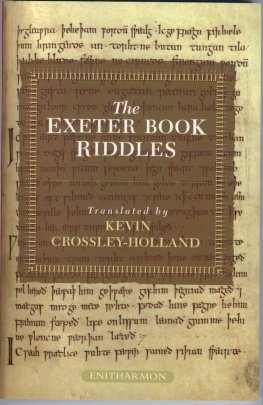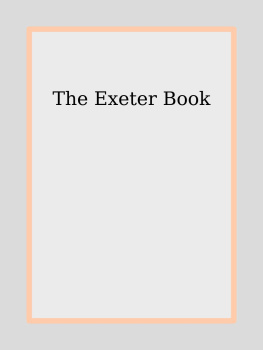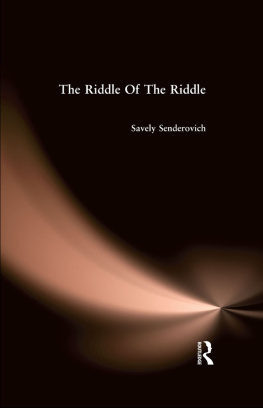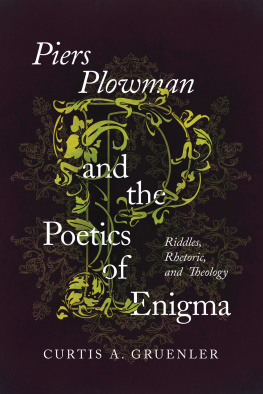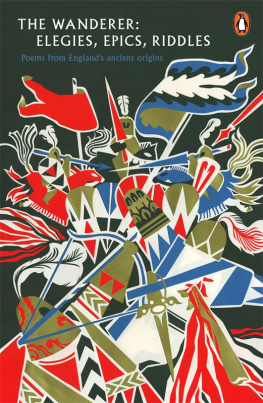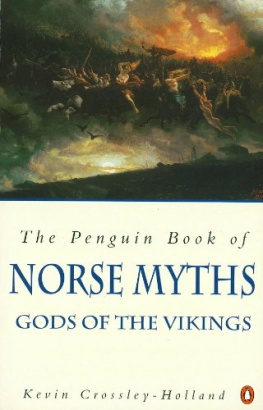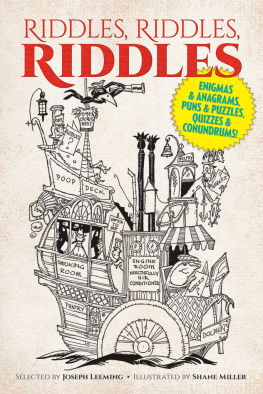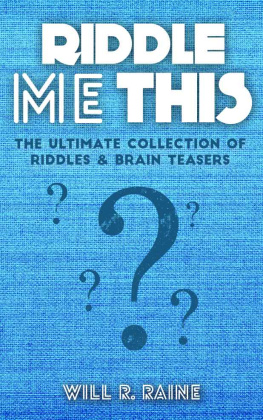Kevin Crossley-Hollands deep interest in the early literature of north-west Europe is reflected in much of his writing. In addition to his Selected Poems and Moored Man, a cycle of North Norfolk poems with watercolours and etchings by Norman Ackroyd, he is the author of The Penguin Book of Norse Myths, while his anthology The Anglo-Saxon World contains his well-known translations of Beowulf and many of the shorter poems. His celebrated books for children, including the Arthur trilogy, Gattys Tale and a retelling of Beowulf illustrated by Charles Keeping, have been translated into well over twenty languages. With the poet Lawrence Sail, Crossley-Holland has edited a collection of modern metaphorical riddles, The New Exeter Book of Riddles, and Light Unlocked, an anthology of Christmas Card poems. He is also the co-author with Ivan Cutting of The Wuffings, a play about Anglo-Saxon East Anglia, and the librettist for Nicola LeFanu of two operas based on medieval legends, The Green Children and The Wildman. Kevin Crossley-Holland is an Honorary Fellow of St Edmund Hall, Oxford, patron of the Society for Storytelling and a Fellow of the Royal Society of Literature.
Published in 2008 by Enitharmon Press 26b Caversham Road London NW5 2DU www.enitharmon.co.uk Reprinted 2010 Distributed in the UK by Central Books 99 Wallis Road London E9 5LN Distributed in the USA and Canada by Dufour Editions Inc. PO Box 7, Chester Springs PA 19425, USA This collection was first published as The Exeter Riddle Book by the Folio Society 1978 Published in Penguin Classics 1979, revised 1993 Kevin Crossley-Holland 2008 ISBN: 978-1-904634-46-1 Enitharmon Press gratefully acknowledges the financial support of Arts Council England, London. British Library Cataloguing-in-Publication Data. A catalogue record for this book is available from the British Library. Typeset in Garamond by Servis Filmsetting Printed and bound in Great Britain byCPI Antony Rowe, Chippenham and Eastbourne
CONTENTS
INTRODUCTION
The nature of the riddle
The business of naming began with the Creation; the business of deceiving followed soon after, in the Garden of Eden. It is reasonable to suppose that as soon as men had wits they delighted in riddling.
And they have delighted in it ever since: metaphor and simile, the detective story, the faked voice on the telephone, the crossword puzzle, the question in the cracker they all hinge on recognition and, because they represent things as other than they are, they are all living members of the riddle family. It was Aristotle who first put his finger on the similarity between riddle and metaphor. In his Rbetoric, he wrote: While metaphor is a very frequent instrument of clever sayings, another or an additional instrument is deception, as people are more clearly conscious of having learned something from their sense of surprise at the way in which the sentence ends and their soul seems to say, Quite true and I had missed the point. This, too, is the result of pleasure afforded by clever riddles; they are instructive and metaphorical in their expression. Just so, and many of Aristotles fellow countrymen are reputed to have lost their lives for being unable to answer the semi-metaphorical riddle: What has one voice, and goes on four legs in the morning, two legs in the afternoon, and three legs in the evening? This is, of course, the famous enigma that the Sphinx, that fabulous winged beast with the head of a woman and the body of a lion, put to each passer-by as she sat by the precipice outside Thebes. Those who were unable to answer she either devoured or hurled over the edge.
And when Oedipus volunteered, It is man, who goes on all fours as a baby, who walks upright in the prime of his life, and who hobbles with a stick in old age, the enraged Sphinx threw herself over the precipice. We know that Egyptians, as well as Greeks, liked riddling, and there are riddles in the first sacred book of the Brahmans, the Rig Veda. One of them depicts the year as a twelve-spoked wheel upon which stand 720 sons of one birth (the days and nights); and a comparable riddle turns up in an early Persian collection which describes knights (the days of the month) riding before the Emperor. These Time-Riddles are one of a number of universal riddle motifs which is why they are also called World-Riddles and find their counterpart in the twenty-second riddle of the Exeter Book, The Month of December. There are riddles in the Koran, too, and in the Bible there is, inter alia, the impossibly difficult riddle that Samson asked the Philistines at Timnah: Out of the eater came forth meat, and out of the strong came forth sweetness. Delilah seduced Samson into telling her the answer (a honeycomb in the carcass of a dead lion) and paid Samson out by passing it on to the Philistines.
The word riddle derives from the Old English rdan, to advise, to counsel, to guide, to explain. And in a wide sense a riddle does teach: it presents the old in new ways. To men sitting at the mead-bench, listening to the professional poet or taking the harp and themselves improvising, the riddle redefined the familiar. The Anglo-Saxon cast of mind and literary mode seems ideally suited to the metaphorical riddle when one considers that the entire body of Old English poetry is packed out with mini-riddles; they are known as kennings, and are in fact condensed metaphors. The sea is described as the swans riding-place, the ships road and the whales path; a sail is spoken of as a sea-garment, a poet as a laughter-smith and a wife as a peace-weaver. Setting aside puns and conundrums and catch-questions, of which there are only a handful in the Exeter Book, what is a riddle but an extended kenning?
The Exeter Book
The first bishop of Exeter was Leofric.
He died in 1072 and amongst his bequeathals to the Cathedral Library was .i. mycel englisc boc be gehwilcum pingum on leo wisan geworht, one large book in English verse about various subjects. This has always been taken to be the Codex Exoniensis or Exeter Book, one of the four great surviving miscellanies of Old English poetry. Probably copied by one scribe during the last quarter of the tenth century, this manuscript consists of 131 leaves or folios and contains a great range of poetry. There are documentary Christian poems, such as Christ, which relates the Nativity and the Ascension and anticipates the Day of Judgement; there are Christian allegories about The Panther and The Whale, which turn up again in many medieval bestiaries, and The Phoenix (a godsend of a bird because of its supposed miraculous resurrection); there are elegiac poems, such as The Wanderer and The Seafarer (memorably translated by Ezra Pound), that are ostensibly Christian in their comparison of the transient life on earth with the eternal life in heaven, but which celebrate the old Germanic qualities of endurance and resilience, tempered by melancholy; there are poems such as Widsith and Deor that draw on the traditions and stories of the pagan Germanic world, survivals of the time before the Angles, Saxons, Frisians and Jutes first came to England; and, of course, there are the riddles. The Exeter Book is a remarkable anthology and, had it not survived, we would have to suppose the range of Old English poetry to be much narrower than we know it to be.
That the manuscript has survived seems virtually accidental. It is possible to deduce from gaps in the text that at least seven folios are missing. At some time it appears to have been used both as a cutting-board, perhaps a sort of bread-and-cheese board, and as a beer-mat; there are scores and circular stains on the first folio. More seriously, the manuscript has also been damaged by fire. A long diagonal burn on the last fourteen folios has destroyed the text of some of the later riddles, the last group of which are the final entry in the manuscript.
Next page
